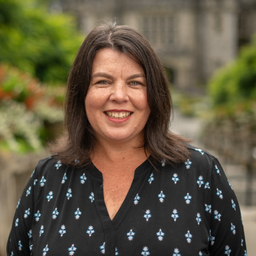Topic: Digital Citizenship and Media Literacy
My Session Status
A Digital Citizenship Collaboration - Inclusion in Action
Helena Prins, BCcampus; Christina Cederlof, Thompson River University
Track: Learning experience design/ Volet: Conception des expériences d’apprentissage
Type: Case study in innovation
Name of the case: A Digital Citizenship Collaboration - Inclusion in Action
Focus of the case: Other: all three - designing an inclusive virtual session
Background:
In May 2020 a group of adult special education (ASE) instructors who were meeting regularly online as a community of practice brought together by the British Columbia Council on Admissions and Transfer mused over the idea of bringing all their students together, just like they were meeting together in that moment. This idea took shape in October 2020 with an email from Christina Cederlof, an associate teaching professor in the Education and Skills Training Program in the Faculty of Education and Social Work at Thompson Rivers University (TRU) to the BCcampus Learning and Teaching team.Christina, along with Helena Prins, an advisor on the BCcampus Learning and Teaching team, and Dr. Matthew Stranach, coordinator of Educational Technologies at TRU, pulled their experience, expertise, and passions together to create a province-wide event with the goal to provide a sense of community for ASE participants and instructors while offering an inclusive and meaningful learning experience on digital citizenship.Two successful and inclusive virtual conferences were held in 2021 (Spring and Fall), bringing together more than 100 ASE students and faculty from across BC.
Problem addressed by the case:
Bringing Adult Special Education students from across the province together to promote Digital Citizenship
Solution devised:
An invitation to participate went out to all members of the ASE community of practice, and the event was delivered in two 90-minute Zoom sessions on March 9 and 23, 2021. Eight institutions joined these sessions: TRU, Selkirk College, Vancouver Island University, Coast Mountain College, Camosun College, North Island College, Vancouver Community College, and Kwantlen Polytech University. Ahead of the sessions and in feedback surveys, many students expressed their excitement about meeting peers from around the province. Students were also given a virtual escape room experience as well as Puzzle Box activity using H5P. Connecting a SME, ed tech developer, facilitator, tech support and coordinator to pull off this meaning virtual experience.
Misinformation and Online Verification: Exploring Fact-Checking Practices by Canadian Adults
Giuliana Cucinelli, Leelan Farhan, Concordia University.
Track: Evidence-based practices in teaching/ Volet: Pratiques de l'enseignement fondées sur des preuves
Type: Research presentation
Rationale for the study:
Over the past five years educators, journalists, politicians and policymakers have been scrambling to respond to the intense rise in disinformation and “fake news”. The suggested solution has primarily been linked to media literacy efforts and engagement. However, the underlying assumption is that the average citizen does not know how to differentiate between real or fake news and as such, policy and education curricula need to invest more resources in critical media skills (boyd, 2017). Furthermore, according to Dr. Jeff Share, critical media literacy recognizes power and “how” information is connected to power, and how information is being framed and communicated (McVicker, 2021).
Research questions:
How do Canadian adults define fact-checking and misinformation?
How do Canadian adults engage with fact-checking practices?
How are schools able to incorporate fact-checking practices in their teaching and classrooms, moving beyond media-literacy?
Methodology:
In this novel study, we survey 200 Canadian adults (aged 18-64) on their perception of their fact-checking and media literacy behaviours through self-reporting, contrasted with their actual process for fact-checking when engaging with a piece of news. The goal of this study is to assess the fact-checking behaviours and perceptions of Canadian adults. First, we ask participants questions about their confidence and practices in their media literacy and fact-checking skills. Then, we provide them with a headline and excerpt from an article. The participants’ task is to determine whether the article is real or fake, and to explain in detail the steps they took in order to arrive at their decision.
References:
Boyd, d. (2017). Did media literacy backfire? Journal of Applied Youth Studies, 1(4), 83-89. Bulger, M., & Davison, P. (2018). The promises, challenges, and futures of media literacy. Journal of Media Literacy Education, 10(1), 1-21.
Bulger, M. (2012). Measuring media literacy in a national context: Challenges of definition, method and implementation. Media Studies, 3 (6), 83-104.
McVicker, S. (2021, April 14). Dr. Jeff share talks about the urgency for critical media literacy in a rapidly evolving media landscape. The PropWatch Project. https://www.propwatch.org/article.php?id=284
Mihailidis, P., & Viotty, S. (2017). Spreadable Spectacle in Digital Culture: Civic Expression, Fake News, and the Role of Media Literacies in “Post-Fact” Society. American Behavioral Scientist, 61(4), 441–454. https://doi.org/10.1177/0002764217701217



